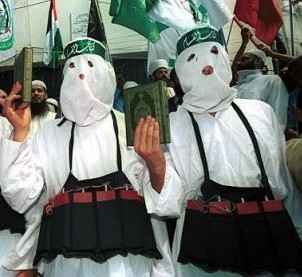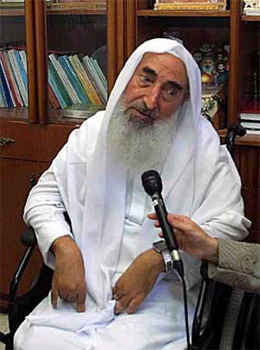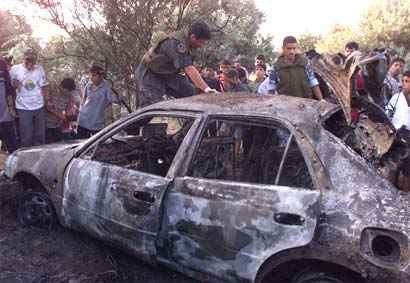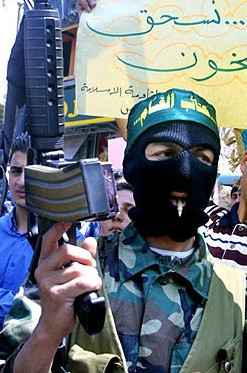|
Hamasaka Harakat al-Muqawamah al-Islamiyya, The Islamic Resistance Movement People used to think Yasser Arafat's Palestinian Liberation Organization was one bad-ass terrorist cabal, and it was true enough... at the time.
People used to think Yasser Arafat's Palestinian Liberation Organization was one bad-ass terrorist cabal, and it was true enough... at the time.But in the late 1980s, Arafat became a statesman, like the vast majority of terrorists eventually do. After he renounced terrorism in 1988, the baton was passed to group known as Hamas, an acronym for Harakat al-Muqawamah al-Islamiyya (The Islamic Resistance Movement). Hamas means "courage" or "zeal" in Arabic. The PLO and Hamas are both Palestinian, but the resemblance largely ends there. Unlike the PLO, which was always a secular movement with mainly political goals, Hamas is a Sunni Islamic fundamentalist group whose stated purpose is to replace Israel with an Islamic Palestinian state. Hamas is particularly strident and racist in its attacks on Jews. The organization endorses the long discredited Protocols of the Learned Elders of Zion and denies the Holocaust occured. According to its official statement on the subject: [A] clear Zionist goal [is] forging history by hiding the truth about the so-called Holocaust, which is an alleged and invented story with no basis. . . . The invention of these grand illusions of an alleged crime that never occurred, ignoring the millions of dead European victims of Nazism during the war, clearly reveals the racist Zionist face, which believes in the superiority of the Jewish race over the rest of the nations.Charming. Although Hamas has taken part in some aspects of Palestinian self-governance under Arafat's Palestinian Authority, the group is more interested in playing the spoiler to Arafat's half-hearted bid for a separatist peace. Hamas would prefer a Taliban-style theocracy, but it has indicated it will at least give proper consideration to any proposal that involves ejecting all Jews from Israel forever.
Hamas ran mosques, schools and other social services until 1987, when the group was re-invented as a primarily militant faction. Hamas was a leading instigator in the intifada (uprising) launched that year in the West Bank and Gaza Strip, taking part in the widespread violence on the streets. Hamas has killed hundreds of people in dozens of attacks since the intifada. Although it has been connected to shootings and other violence, especially in its early militant days, its favored techniques now run strongly toward bombings—suicide bombings of every stripe. The classic image of the terrorist wearing a vest made of dynamite should pretty much give you the right idea, although Hamas operatives have been known to use grenades, car bombs and truck bombs as well. The group targets mostly Israeli civilians in "soft target" locations like nightclubs and commuter buses. Typically, Hamas racks up a couple dozen victims at a time, unlike al Qaeda, which often tries to target scores, hundreds or even thousands of people at once. The group's terrorist operations are funded in large part by Iran, as well as by a network of Islamic charities. Although Hamas has maintained its charitable and social operations, some of this money is clearly paying for bombs and martyrdom stipends to the families of suicide bombers. Former Iraqi dictator Saddam Hussein also helped pay suicide stipends, a rare instance in which Iran and Iraq were on the same side of anything. Hamas has formally declined to take part in the Palestinian Authority government structure sanctioned by the Israelis, although Hamas sympathizers have run for and achieved office. Hanging on to leadership of the Authority by his fingernails, Arafat has had a love-hate relationship with Hamas since he took the political route, crafting temporary alliances then hanging them out to dry five minutes later.
Despite the fact that Arafat was the anointed leader of the Palestinian territories, the Israelis took a hard line, repeatedly punishing the Authority for Palestinian terrorism. Having renounced violence (at least in public), Arafat frequently looked weak after these reprisals. A second intifada broke out in October 2000, and Hamas led the way with dozens of suicide attacks. Then the September 11 attacks changed everything. After these unprecedented attacks, the U.S. declared an all-out war on terror, a war that was explicitly without exceptions. Israel read President George W. Bush's tough-talk on terrorism as a greenlight to do whatever it wanted in the Palestinian territories... which pretty much turned out to be the correct interpretation.
The U.S. threw fuel on the fire by vetoing a U.N. resolution condemning the killing, after which Hamas threatened to attack American interests. Hamas has been known to operate around the world, but operations against Israel have been its main focus in the past. The threats against the U.S. have not (as of this writing) translated into actual attacks. Politically, Hamas has always been slightly weaker than Arafat's Fatah party, but the situation on the ground in the Palestinian territories is extremely fluid. Shortly after the assassination of Yassin, Israeli Prime Minister Ariel Sharon announced an extremely unpopular plan under which Israel would withdraw from Palestinian territories but retain a claim to disputed settlements in the West Bank and Gaza (with backing from the U.S.). Infuriated, Hamas named a hardliner, Abd al-Aziz al-Rantissi, to succeed Yassin. In April 2004, Israel dropped a missile on his head too. Taken together, all these moves enraged the segment of the Middle East that passes for "moderate," and the resulting groundswell of sympathy has done more to move Hamas into the mainstream of political discourse than all of the group's social welfare programs put together. In April 2004, Hamas edged ahead of Fatah in popularity polls for the first time. Though it wasn't obvious at the time, this statistical milestone may have been the first shot of the apocalypse. As the Islam and West (embodied in the U.S.) became increasingly polarized, Fatah began to look like it was out of touch. Appeasement has never been the sexiest of ideologies, especially compared to jihad. With Israel's leadership in crisis after Ariel Sharon's crippling stroke in early January 2006, there would never be a better moment to launch a revolution. Ironically, that revolution was fought at the ballot boxes, yet another example of the fatal flaw in George W Bush's plan to bring democracy to the Middle East. Given half a chance, the residents of the Middle East will vote for violent Islamists. When Palestine held its first-ever parliamentary elections at the end of January, Hamas didn't just win. It won in a landslide, obliterating the Fatah party and throwing the entire world into a frenzy. Election day was barely over before the world's leaders lined up to encourage dialogue (possible), politely request that Hamas disarm itself (unlikely), or furiously sputter "we don't negotiate with terrorists" (unhelpful). The Israelis and the United States adopted the latter stance, foreshadowing an escalation of military conflict which is likely to embroil the rest of the region in short order. The president of Palestine, a Fatah member, rather ludicrously vowed to continue the peace process as riots broke out all over Gaza demanding that he resign. In response to all the international pressure for peace, Hamas issued its own "roadmap" for peace in the Middle East, which included such key provisions as the defeat of Israel and the defeat of everyone who ever supported Israel, including the United States and Europe. The latest poster children for democracy capped off this stirring statement of principles by denying the Holocaust and promising to degrade and humiliate Israel before eradicating it. They also darkly warned that people should have been nicer to them. A statement by Hamas' latest leader, Khaled Mash'al, was translated by the Middle Eastern Media Research Institute thus:
I say to the [European countries]: Hurry up and apologize to our nation, because if you do not, you will regret it. This is because our nation is progressing and is victorious. Do not leave a black mark in the collective memory of the nation, because our nation will not forgive you. Maybe ten years ago, such a threat would have been laughable, coming as it did from an extremist party in an occupied territory with a population slightly smaller than that of Idaho. These days, it's just par for the course in the New World Order.
Timeline
|
 Sheikh Ahmed Yassin registered Hamas as a religious organization in 1978 as a social organization branched off from a pan-Arabic Sunni organization known as the
Sheikh Ahmed Yassin registered Hamas as a religious organization in 1978 as a social organization branched off from a pan-Arabic Sunni organization known as the  Israel and Hamas existed in a stalemate for several years. During that time, Hamas made some inroads in the mainstream Palestinian political culture, its position often enhanced by Arafat's efforts to deal with the Israelis.
Israel and Hamas existed in a stalemate for several years. During that time, Hamas made some inroads in the mainstream Palestinian political culture, its position often enhanced by Arafat's efforts to deal with the Israelis.  The hostilities between Hamas and Israel ratcheted up several times in the wake of September 11. In June 2002 and September 2003, the Israelis tried unsuccessfully to
The hostilities between Hamas and Israel ratcheted up several times in the wake of September 11. In June 2002 and September 2003, the Israelis tried unsuccessfully to